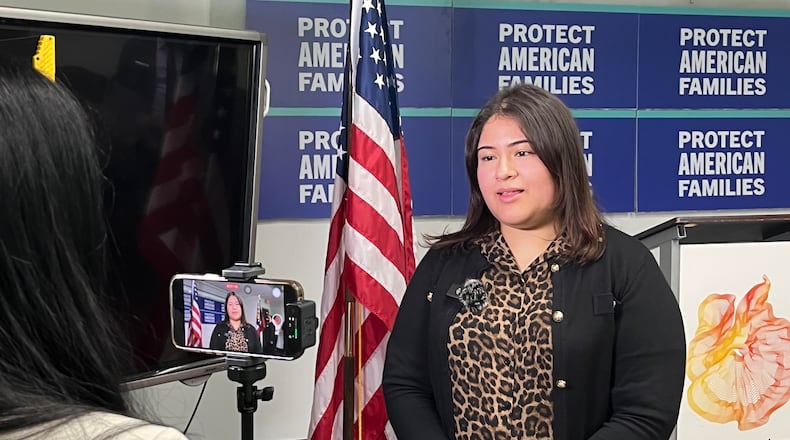Although Briseyda Neri, 23, was born in Atlanta, she felt unrooted during her tumultuous childhood in Georgia. A recurring stressor was her Mexican mother’s lack of legal status.
At four years old, Neri was separated from her mother for a month while the latter was held in an immigrant detention center.
“I remember wondering where my mother was, I would stand by the window and ask my dad when mommy would come home.” Neri said, while holding back tears. “I will never forget that fear and uncertainty of coming home from school and not seeing my mother.”
On Wednesday, Neri joined a group of immigrant rights’ advocates at the Latin American Association in Atlanta to call on President Joe Biden to extend protections to undocumented immigrants who have been long-term residents in the U.S. The speakers addressed local press, mostly from Spanish-language TV outlets, in front of a panel of signs that read: “protect American families.”
Over 330,000 unauthorized immigrants call Georgia home, according to an estimate from the Migration Policy Institute. Nearly 65% of people in that group have been living in the country for 10 years or more.
“These individuals have been a vital part of our community for decades, they have been paying taxes, building their lives, raising families, and contributing in countless ways,” said Jaime Rangel, with FWD.us, an immigrant advocacy group. “The Biden administration has failed to take significant action over the past four years to provide relief to our long-term undocumented residents in the U.S. and it’s now time for the President take action. … Deportation relief is essential for keeping families together.”
The immigrants and advocates gathered on Wednesday threw their support behind specific policies they said the Biden administration could enact without legislative support.
First, they called for a parole program that would allow the undocumented spouses of U.S. citizens to live in the country without fear of deportation. At the moment, the only path to deportation relief for most undocumented immigrants married to U.S. citizens requires spending several years outside the country while waiting out immigration bans.
Juan Terrazas, from the Path Project, a nonprofit serving children, called the status quo a “Sophie’s choice” for undocumented mothers and fathers, many of who must pick between remaining in the shadows in the U.S. or leaving their families and move away in the hope of adjusting their status.
Terrazas also called for Biden to create more Temporary Protected Status (TPS) designations. TPS is a form of humanitarian relief that has historically been granted to immigrants who hail from crisis-riddled countries such as Haiti, Sudan or Venezuela. TPS recipients are shielded from deportation, and they are immediately eligible for work permits.
“Work authorization for these families come with countless jobs opportunities beyond those that they can find in the underground economy,” said Terrazas.
Advocates said these moves would solidify undocumented immigrants’ footing in Georgia’s economy and increase their tax contributions.
Since starting his term, Biden has presided over an unprecedented surge of migration at the southern border, which he has attempted to manage through a mix of restrictions on asylum and new pathways to come to the U.S. legally. But his latest posture on immigration seems to be more restrictive, as he attempts to diffuse Republican criticism of an overwhelmed border in the lead-up to the election.
Earlier this year, Biden threw his support behind a bipartisan Senate bill that would have triggered new border restrictions while failing to lay out a pathway to citizenship for undocumented immigrants already in the U.S. The bill ultimately failed due to Republican opposition.
Also on hand at the Latin American Association on Wednesday was Tracy González, whose husband came to the U.S. without authorization.
Credit: Lautaro Grinspan
Credit: Lautaro Grinspan
Despite his spending decades in the country, his lack of status means González and her family have “no permanent feeling of security,” she said.
“This way of life is unstable,” she added, noting she has two daughters and five grandchildren with her husband. “Our family’s future is in the hands of these immigration policies.”
The Atlanta Journal-Constitution and Report for America are partnering to add more journalists to cover topics important to our community. Please help us fund this important work here.
About the Author
Keep Reading
The Latest
Featured





